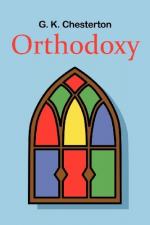
|
| Name: _________________________ | Period: ___________________ |
This test consists of 15 multiple choice questions and 5 short answer questions.
Multiple Choice Questions
1. What conclusion does the complete skeptic eventually reach?
(a) No one else can think for him.
(b) He has no right to think for himself.
(c) There are no answers to be found.
(d) He will never find the answers.
2. What document does Chesterton refer to by the word "orthodoxy"?
(a) The Athanasian Creed.
(b) The Nicene Creed.
(c) The Disciples' Creed.
(d) The Apostles' Creed.
3. How does Chesterton feel about the book Orthodoxy once it is completed?
(a) He is very proud of it.
(b) He would never read it.
(c) It is not perfect but he's happy.
(d) He wants to write a sequel.
4. What does Chesterton say concerning the boundaries of the will?
(a) The will frees a man.
(b) The will is limiting to the man.
(c) The will defines a man's actions fully.
(d) The will has boundaries only if it is not a free action.
5. Why does Chesterton admire Joan of Arc?
(a) She turned her fright into courage, when faced with battle.
(b) She is an icon of Christianity and courage.
(c) She is everything that he admired.
(d) She provides courage to the French.
6. In the same story of the sailor, what is better than discovering a new land?
(a) Discovering that the new land is really the old one.
(b) Claiming the new land for your own.
(c) Settling the new land and making it familiar.
(d) Returning home to the old land.
7. Why does Chesterton think glass is so often used in fairy tales?
(a) Glass easily portrays vivid emotions like anger.
(b) Glass is cheap and common.
(c) Glass is unusual for shoes and houses, and fitting to fairy tales.
(d) Glass, like happiness, is easily broken.
8. In fairy tales and fiction, what change does Chesterton name that makes the stories monotonous?
(a) The hero is boring and not surprised by the adventures.
(b) There is no original model for a hero.
(c) The hero is now abnormal and his adventures are not surprising.
(d) The hero has no precedent for resolution to the conflict.
9. According to Chesterton, at the beginning of Chapter Two, what happens to the men who believe in themselves?
(a) They have difficulty maintaining that belief.
(b) They achieve far more than other men do.
(c) They are never properly appreciated.
(d) They end up in insane asylums.
10. What is the title of the essay that H. G. Wells wrote on skepticism?
(a) Understanding the Skeptical Mind.
(b) Skepticism from a Philosophical Viewpoint.
(c) Doubts of the Instrument.
(d) The Creeds and Hierarchies.
11. Why does Chesterton think that materialism is much narrower than Christianity?
(a) Materialism has a smaller view of man.
(b) Materialism cannot allow even a hint of the supernatural or strange.
(c) Materialism has no belief in an afterlife.
(d) Christianity encompasses all of Judeo-Christian tradition.
12. How does Chesterton describe a madman's reasoning?
(a) As a tangle of threads.
(b) As a small, perfect circle.
(c) As an infinite line.
(d) As a precise box.
13. What words does Chesterton prefer when referring to nature?
(a) Charm, spell, enchantment.
(b) Law, necessity, order.
(c) Law, theory, science.
(d) Necessity, order, tendency.
14. In Chapter IV, The Ethics of Elfland, what does Chesterton name as the first principle of democracy?
(a) The essential things are those they hold as individuals.
(b) Men act within the body of citizens.
(c) The essential things are those they hold in common.
(d) Men act as individuals.
15. What does Bernard Shaw assert about the idea of choice?
(a) Choice has replaced free will as the standard of desire in a man's life.
(b) Choice has little effect in a man's philosophical thinking.
(c) Choice has replaced happiness as the standard of desire in a man's life.
(d) Choice was an effective contrivance in past ages but not in the modern age.
Short Answer Questions
1. In Chesterton's story about the sailor, what mistake does the man make?
2. What does Chesterton say is losing its authority in the modern mind?
3. According to Chesterton at the beginning of the first chapter, why did he write the book?
4. What is Chesterton's attitude toward fairy tales?
5. In Chapter III, The Suicide of Thought, how does a test of happiness compare to a test of the will?
|
This section contains 795 words (approx. 3 pages at 300 words per page) |

|




